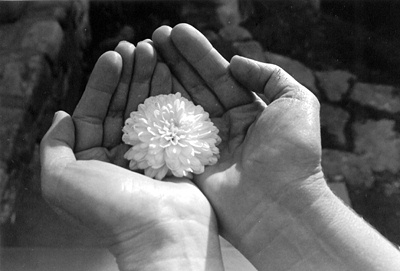All Nonfiction
- Bullying
- Books
- Academic
- Author Interviews
- Celebrity interviews
- College Articles
- College Essays
- Educator of the Year
- Heroes
- Interviews
- Memoir
- Personal Experience
- Sports
- Travel & Culture
All Opinions
- Bullying
- Current Events / Politics
- Discrimination
- Drugs / Alcohol / Smoking
- Entertainment / Celebrities
- Environment
- Love / Relationships
- Movies / Music / TV
- Pop Culture / Trends
- School / College
- Social Issues / Civics
- Spirituality / Religion
- Sports / Hobbies
All Hot Topics
- Bullying
- Community Service
- Environment
- Health
- Letters to the Editor
- Pride & Prejudice
- What Matters
- Back
Summer Guide
- Program Links
- Program Reviews
- Back
College Guide
- College Links
- College Reviews
- College Essays
- College Articles
- Back
My Mother's Hands MAG
My mother has had hands for as long as I can remember.
This may seem like an obvious statement, but throughout my childhood my mother emerged in bits and pieces. The way the color of her eyes changed, the hook of her nose, the way her voice thinned and eyes narrowed when the house wasn’t clean.
The house was never clean. Never clean enough.
But her hands have always been there. They are truly my mother’s hands, and belong to no one else.
My mother’s hands are a wonderfully mysterious contradiction to me. Like most things, they have two sides to them.
On the palm, they belong to the woman that is my mother – not wife, not daughter, not teacher, not friend. Mother, my mother. The skin is impossibly soft and light and thin, like wind stretched delicately into a sheet of paper. The palm has been rounded and softened by the hair and breath of children. My mother’s hands always touch me by the palm, and that very palm, always exposed to me, is kind and warm, the veneer of the woman we know.
This is the woman who trained me to feel sick if I ever lied, the woman whose top knots are a thing of legend. The woman who claims she’s bad at cooking but makes unbelievable cerny kuba and red velvet cake and crusted mac and cheese, the woman who held my hair back as I retched after too much of that red velvet cake and crusted mac and cheese. Her palms give me the woman who read me E.B. White and who smelled fruit-flavored markers with me.
But the back of my mother’s hands are more interesting.
The back of my mother’s hands I know better than my own. Veined, knotted. The skin is thin, stretching over like a filter between the air and my mother’s blood. It is the hand of a skeleton, the bone ridges painfully thrown into relief, rivers of concealed veins strangled across them. Years and decades and a lifetime of cracking her knuckles as a nervous habit has left them knobby, infinitely prominent.
It is the hand of an older woman who has seen and felt pain, and it is only when I notice the back of my mother’s hands that I begin to patch together the purple bags around her eyes, the lines etched around her mouth that will someday be carved into my own, the way she cracks her neck in pain as she gets up in the morning, the way she looks at herself in the mirror.
The back of her hands is the woman who works in a job she hates with people she loves, the woman who snaps at me when I leave food out or dishes unwashed, the woman who drinks her morning coffee in total silence. It is the woman who watches endless movies at 2 a.m. because she cannot has not will not sleep even though she needs it desperately.
When my mother cries, I stare at the back of her hands, where the skin is scrunched and where it is not, like a topical map of the life she led before, the life I have pieced together from others’ memories. Before my brother, before me, before the house, before her husband.
I suspect she has old hands – an old soul – but she has told me this is not true, not since she was a little girl, the core of an affair, a divorce, the small girl who never felt wanted in a family that knew and held in their hearts the circumstances of her birth.
I can see the skin wrinkling as she clenches her fists.

Similar Articles
JOIN THE DISCUSSION
This article has 0 comments.

Throughout my childhood I've been drawn to novels written by strong female writers about the ever-looming presence of mother. (Think Divine Secrets of the YaYa Sisterhood, The Secret Life of Bees, or Mists of Avalon). All of my writing since has a tendency to drift toward the psyche of mother-daughter relationships.
I was once given a prompt to write about my mother's hands and a standing tribute to my mother as a fully fledged human who I have yet to fully understand, not only the woman who raised me, but the woman who I am discovering in pieces, with flaws frighteningly similar to my own.